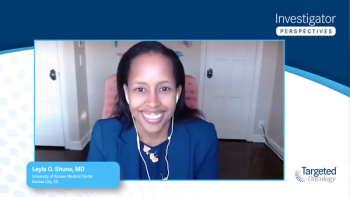
Translating Clinical Data Into Practice: Strategies to Implement Enhanced Dermatologic Management With Amivantamab + Lazertinib in Advanced NSCLC
A panelist discusses how proactive management of dermatologic adverse events (DAEs) in cancer treatment, through early detection, tailored interventions, and collaboration with specialists such as dermatologic oncologists, advanced practice providers (APPs), and pharmacists, significantly enhances patient comfort, treatment adherence, and overall outcomes.
Episodes in this series

Summary for Physicians: Proactive Management of DAEs in Cancer Treatment
Proactive Management Strategies: Implementing a proactive regimen for managing DAEs involves early recognition, tailored interventions, and ongoing monitoring. Key strategies include:
- Regular skin assessments and early detection of potential dermatologic issues.
- Educating patients on self-care techniques and signs to watch for.
- Implementing preventive measures, such as moisturizers or sunscreen, before treatment-related skin changes occur.
- Close monitoring of high-risk patients and adjusting treatment protocols when necessary.
Roles of Other Specialists:
- Dermatologic oncologists: Provide specialized expertise in managing complex skin reactions and guide the treatment of severe or persistent DAEs.
- APPs: APPs can facilitate timely screenings, follow-up care, and patient education on dermatologic concerns.
- Nurses: Nurses play a crucial role in monitoring skin integrity, educating patients, and assisting in managing treatment regimens for skin issues.
- Pharmacists: Pharmacists contribute by ensuring proper use of medications (eg, topical treatments and antibiotics) and identifying potential drug interactions or adverse effects that could worsen dermatologic conditions.
- Others: Supportive care teams, including nutritionists or psychosocial counselors, can address related concerns (eg, stress or nutritional deficiencies) that may impact skin health.
Fostering Collaboration: Collaboration is built on open communication and regular team meetings.
- Establishing a clear referral pathway and multidisciplinary case discussions ensures seamless integration of care.
- Using electronic health records for shared documentation can streamline communication and help track patient progress.
Importance of Multidisciplinary Care: Multidisciplinary care is essential for optimizing patient outcomes, as it integrates the diverse expertise of various specialists. By addressing DAEs from multiple angles (eg, prevention, early intervention, and pharmacologic management), patient comfort, quality of life, and adherence to cancer treatments are enhanced. Effective teamwork also facilitates personalized care plans that are dynamic and adaptable to patient needs. Ultimately, collaboration improves both immediate dermatologic outcomes and long-term cancer treatment success.


















